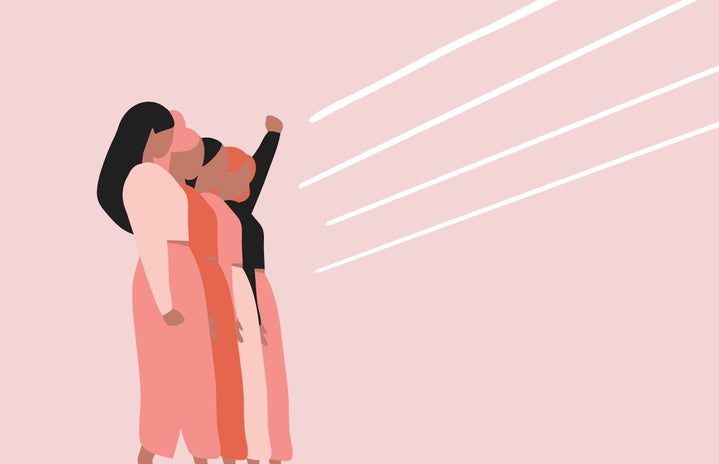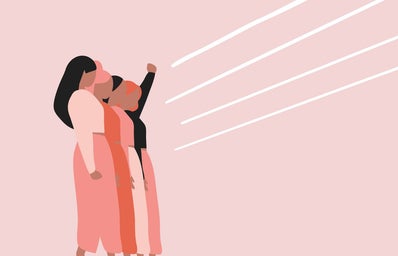Even though the nation is social distancing, that doesn’t mean that young people have stopped fighting for change. Most schools in the U.S. are exclusively online, but organizations are meeting via Zoom to prove that social justice is alive and well, even amidst a pandemic. Student activists are still hard at work talking with stakeholders, organizing their peers, and working on impact projects—just virtually.
I spoke with a few student activists to see what they’re doing to continue efforts during the pandemic. If you’ve been concerned about how to stay active with civic engagement these past few weeks, below is all the inspiration you need to get started.
What kind of activist work are you currently involved in?
Taylor Marzouca: I’m currently the Pennsylvania state coordinator for Rock The Vote, the “campus core leader” for Bernie Sanders at my school, and I have been doing other work regarding labor organizing and neighborhood organizing in the city.
Shivani Nishar: For the past four years, I have been heavily involved in mental health and disability justice organizing at Brown University. Right now, I am one of the lead organizers for #BruNOFail, a campaign dedicated to pushing Brown to adopt a universal pass policy for the Spring 2020 semester. The other organizers and I all come from justice communities and strongly believe that giving “no credit” (Brown’s version of a “fail”) during a global pandemic is inequitable given the variety of circumstances students are in right now. We are working with students who have gone home to abusive families, who no longer have access to mental health care because of insurance and/or familial obstacles, who are financial/housing insecure, and who are now the primary caretakers for family members.
Deana Ayers: I currently serve as the vice president of the student government association where I advocate for progressive policies that benefit the student body. I am also involved in reproductive justice organizing, both on campus with the Reproductive Rights Organization of Student Educators, and off campus through my own independent efforts.
How do you take on these issues while social distancing?
Taylor: Google Hangouts has become my best friend. I’ve been having a ton of virtual meetings to brainstorm how we’re going to get through that exact question: How do we do what we’re doing virtually? We’ve been thinking about social media campaigns and challenges, because that seems to be everyone’s quarantine go-to. For example, we are getting a group of people to make videos about a specific issue, and calling others to join in.
Shivani: Organizing this campaign involved circulating our petition through many networks, receiving faculty support, and gathering 100+ student testimonials for our Facebook page. It has involved numerous calls with administrators, other student organizers, and working nonstop to address concerns and questions in our email page, direct messages, and Brown’s anonymous Facebook page.
How has the shift to going online changed the work you do?
Deana: It’s so important to look at the organizing that disabled students and community members are frequently having to do to get their needs met because they’ve been organizing digitally and communicating in this way much longer. Disabled organizers are the OGs of digital organizing, and abled people should both look to them as the model and make sure to aid their efforts wherever we can
Shivani: I think it’s really important to reflect on how successful our campaign has been in reaching a majority of our student community because many of our organizers identify as disabled and/or mentally ill. For us, online organizing works, and we’ve been doing it long before COVID-19. Activism, in general, has a long history of being ableist and leaving out the disability community. Whether it’s hosting town halls in inaccessible buildings, requiring that people march, not providing interpreters or breathing rooms, or the general culture of needing people to “show up” to prove they care, accessibility is not prioritized. This has forced us to find other methods of engaging in the organizing work we deeply care about that can be inclusive of all identities, and online organizing has been one of those methods.
How can others students make an impact while at home?
Taylor: One thing I think everyone needs to be doing right now is to pay attention to the social media activism that’s going on and take it seriously. Also, if you want to make an impact, make sure you’re paying attention to the issues affecting you and your communities directly—may that be your school, college students generally, your city, or immediate neighborhood. Pay attention!
Deana: Students can make an impact while social distancing just by signing up to help with a digital campaign of any kind. Especially for what I’m working on, #CancelRentTX, just getting people in the door can be the most difficult part. You’re doing everyone in your community a favor just by reaching out at this moment and saying you want to be part of any movement for change. Looking at the different political organizations or super plugged-in friends that you frequently engage with and asking how you can help is a quick and easy first step into organizing from home.
These three badass college student activists show you that working from home is not a new thing at all, but has been a tool used by and for people with disabilities— and now because of the coronavirus, the rest of the world is learning how to take advantage of technology in social justice work. While you may not be able to attend a local march or knock on doors to talk about an important issue, you are still able to execute similar actions with the tip of your fingers. Social media platforms like Twitter and Instagram are widely known for keeping you up to date with work being done both state-wide and internationally. Don’t forget to reach out to engaged friends who may know of opportunities!
A final reminder while times are tough and unsure: It is okay to take care of you first, and then plunge into community work.


